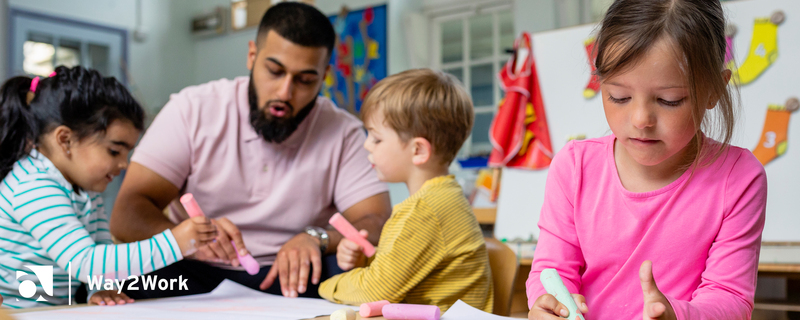{{ root_page.title }}
Early years and childcare

"During completing my qualifications my assessor has been very supportive nothing has been too much trouble. During this course I feel my confidence has grown leaps and bounds, the support given to me by my setting has been amazing. They have supported me hugely offering me training to support my current role and offering me extra time to complete work and tasks due."
- Millie Mcfertridge - Early Years Practitioner - Lavender Lane Pre School
So you want to know more about becoming a...
Level 2 Early Years Practitioner
What does an early years practitioner (EYP) do?
An EYP will care for babies and children from birth to 5 years old. Their role includes supporting the planning of and delivery of activities, purposeful play opportunities and educational programmes whilst implementing the requirements of the Early Years Foundation Stage (EYFS).
The EYP will work as part of a professional team, ensuring the welfare and care of children under the guidance and supervision of an early years educator, teacher or other suitably qualified professional within the early years workforce.
What does their day-to-day role look like?
In their daily work, an EYP interacts with parents, children, colleagues and wider multi-agency professionals and partners such as health visitors. social workers and speech and language therapists.
They are responsible for supporting child initiated and adult-led activities based around the needs and interests of each individual child.
An EYP supports the observation and assessment of each child to contribute to their learning experience and assists with the care needs of the individual child such as feeding, changing etc. under the direction of a more senior member of the team.
They will also have a responsibility for ensuring that they implement safeguarding and also health and safety for the children, staff and others on the premises.
Career progression
As well as ensuring full competency as an EYP, this standard provides a foundation for potential progression into a number of other roles within the early years workforce, such as:
- Childminder assistant
- Nanny & early years worker
- Nursery assistant
- Nursery nurse
- Nursery practitioner
Duration of apprenticeship
Usually, 12 months.
Qualifications needed prior to completion of apprenticeship
Apprentices without level 1 english and maths will need to achieve this level and apprentices without level 2 english and maths will need to take the tests for this level prior to taking the End Point Assessment.
For those with an education, health and care (EHC) plan or a legacy statement, the apprenticeship's english and maths minimum requirement is entry level 3. A British Sign Language (BSL) qualification is an alternative to the english qualification for those whose primary language is BSL.
End Point Assessment (EPA)
When your training is complete, we will make the decision, along with your employer, to put you forward to your End Point Assessment (EPA). This is the final process in your apprenticeship, it is an assessment of the knowledge, skills and behaviours that you would have learn throughout the apprenticeship.
This will involve an Independent Assessor visiting you in your workplace to complete the following:
- Knowledge Test
- Professional Discussion (with Portfolio of Evidence included)
Your employer, your Assessor and the W2W team will support you through the EPA. For more information about the process, you can contact the W2W team at [email protected]
When you have successfully completed your apprenticeship and passed your EPA, you will be awarded a certificate.
View the full scheme of work for the Level 2 Early Years Practitioner qualification (PDF)
Becoming an early years practitioner / educator is a rewarding job, not only will you be making a real difference to the lives of children, your work will benefit their families, the school and the local community.

Level 3 Early Years Educator
What does an early years educator (EYE) do?
An early years educator (EYE) and other job roles such as nursery nurse and childminders, are highly trained professionals who play a key role in ensuring that young children learn and develop well and are kept healthy and safe. They work in a range of settings including nurseries, children's centres, reception classes and childminders will often work in their own homes.
An EYE may work on their own or supervise others to deliver the Early Years Foundation Stage (EYFS) requirements set by the Government for the learning, development and care of children from birth to 5 years old.
An EYE will also be expected to have knowledge of the needs of children aged 5 to 7 years.
What does their day-to-day role look like?
In their day to day role, an EYE plans and supervises the children in their care, engaging in activities which are based around the needs and interests of each individual child. They support children to develop numeracy and language skills through learning through play and they will be the key person responsible for ensuring each child feels safe and secure.
An important part of the role is addressing the care needs of the individual child such as feeding, changing nappies and administration of medicine. They will work in partnership with other colleagues, parents and/or carers or other professionals to ensure each and every child thrives in their care.
An EYE is responsible for ensuring that they implement good practice with regards to safeguarding children and health and safety.
Career progression
As well as ensuring full competency as an Early Years Educator, this standard provides a foundation for potential progression into a number of other roles within the Early Years Workforce, such as:
- Manager of an early years setting
- Early years teacher
- Education consultant
- Family support worker
- Health play specialist
- Learning mentor
Salary indicator
The following roles and salaries are an indication of what an apprentice may earn once completing an Early Years and Childcare apprenticeship:
- Nursery assistant: £20,660 per annum
- Early years practitioner: £21,386 per annum
- Early years educator: £27-28,000 per annum
- Nursery practitioner: £21,386 per annum
Duration of apprenticeship
Usually, 18 months.
Qualifications needed prior to completion of apprenticeship
Apprentices without level 2 english and maths will need to achieve this level prior to taking their end point assessment. For those with an education, health and care (EHC) plan or a legacy statement, the apprenticeships english and maths minimum requirements are entry level 3, and the British Sign Language qualification is an alternative to english qualifications for apprentices for whom this is their primary language.
Apprentices must also successfully complete the level 3 award in paediatric first aid or level 3 award in emergency paediatric first aid.
End Point Assessment (EPA)
When your training is complete we will make the decision, along with your employer, to put you forward to your End Point Assessment (EPA). This is the final process in your apprenticeship, it is an assessment of the knowledge, skills and behaviours that you would have learnt throughout the apprenticeship
This will involve an Independent Assessor carrying out the following:
- Observation
- Professional discussion (with Portfolio of Evidence included)
Your employer, your Assessor and the W2W team will support you through the EPA. For more information about the process, you can contact the W2W team at [email protected]
When you have successfully completed your apprenticeship and passed your EPA, you will be awarded a certificate.
View the full scheme of work for the Level 3 Early Years Educator qualification (PDF)
Level 5 Early Years Lead Practitioner
What does an early years lead practitioner do?
This occupation is found in a range of settings which can include day nurseries, playgroups, nursery schools, pre-schools, kindergartens, primary schools, hospitals, social care settings, out of school environments and local authority provision. The broad purpose of the occupation is to be a proactive and influential practitioner, working directly with children, skilfully leading day to day practice at an operational level. As active practitioners they are effective role models of play based learning, supporting others to develop their own practice.
What does their day-to-day role look like?
In their daily work, an employee in this occupation interacts with children aged birth to eight years, families, practitioners, other professionals and appropriate agencies. An employee in this occupation will be responsible for supporting the quality of learning and development in their setting. They lead on the operational aspects of this provision and are typically responsible for leading other practitioners, an aspect or environment such as; Communication and Language, Planning and Assessment, Forest School, Physical Activity and Nutrition. They usually report directly to the head of the setting (The Manager, The Leader, The Director).
Career progression
Assistant manager, Baby room leader, Deputy manager, Early years coordinator, Early years foundation stage lead or coordinator, Early years officer, Early years practitioner, Early years support worker, Education welfare officer, Health play specialist, Higher level teaching and learning assistant, Hospital play worker, Key worker, Lead baby room practitioner, Lead practitioner, Nursery officer, Pastoral assistant, Pastoral care manager, Play leader, Pre-school leader, Room leader, Senior key worker, Senior practitioner, Specialist practitioner in child development (health), community nursery nurse.
Duration of apprenticeship
24 months. However, there are accelerated apprenticeship options available based on the credentials of apprentices meaning that the apprenticeship can be completed in a shorter period of time.
Qualifications needed prior to completion of apprenticeship
As of February 2025, the government announced that apprentices who are aged 19+ at the start of their apprenticeship training no longer require maths and English as part of apprenticeship completion rules. This applies to all learners currently on an apprenticeship as well as new apprenticeship starters.
Some employers will still require applicants to already have English and maths qualifications prior to starting apprenticeships or during them however for other employers this will no longer be a requirement for their apprenticeships so please make sure to read the English and maths requirements for apprenticeships when you complete your application.
End Point Assessment (EPA)
When your training is complete we will make the decision, along with your employer, to put you forward to your End Point Assessment (EPA). This is the final process in your apprenticeship, it is an assessment of the knowledge, skills and behaviours that you would have learnt throughout the apprenticeship
This will involve an Independent Assessor carrying out the following:
- Observation
- Professional discussion (with Portfolio of Evidence included)
- Case study with report, presentation and questioning
Your employer, your Assessor and the W2W team will support you through the EPA. For more information about the process, you can contact the W2W team at [email protected]
When you have successfully completed your apprenticeship and passed your EPA, you will be awarded a certificate.
Get in touch
Take up this opportunity and we can make this career a reality for you - join our Level 2 Early Years Practitioner / Level 3 Early Years Educator / Level 4 Early Years Lead Practitioner programme today!
- View our current vacancies
- Or express your interest

